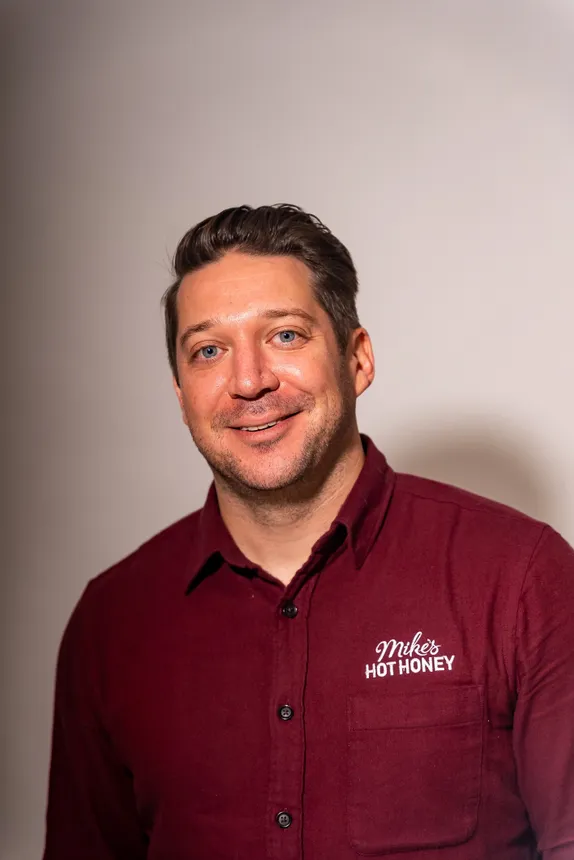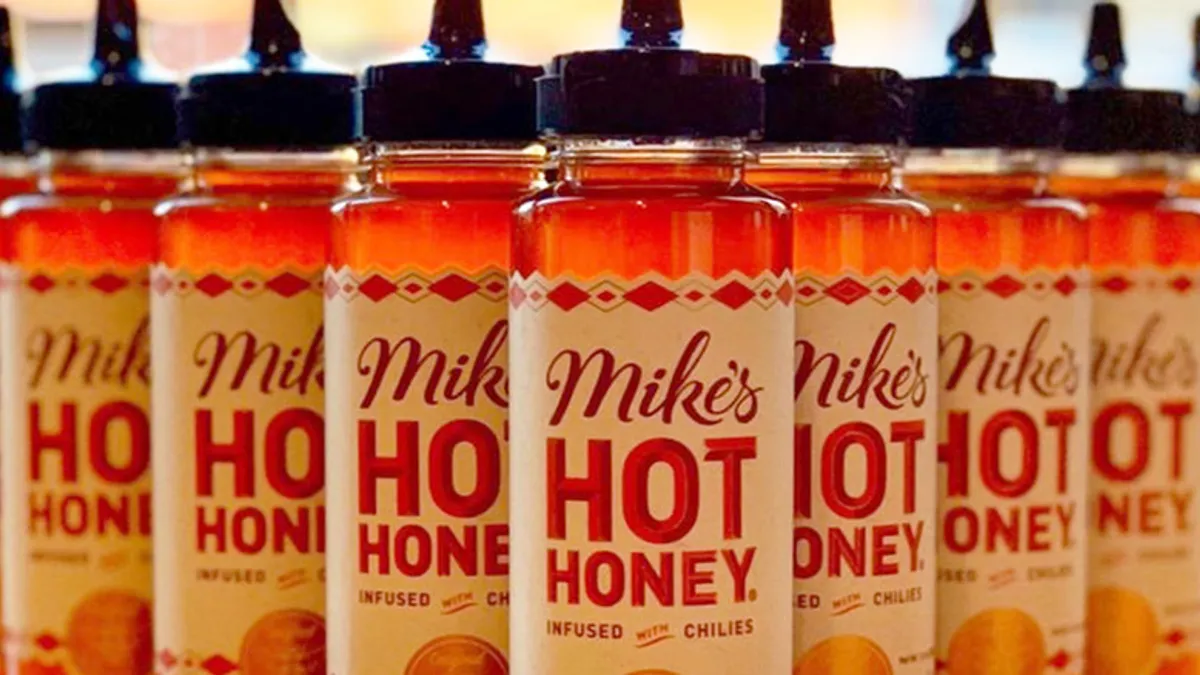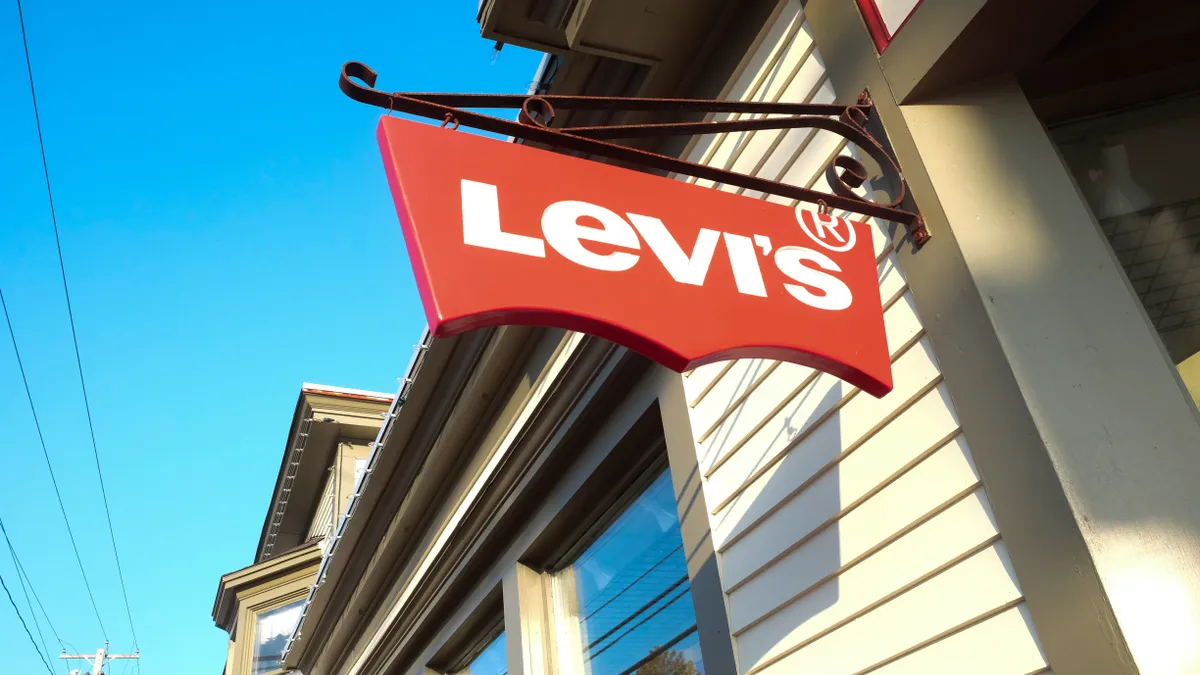This interview from sister publication Food Dive has been edited for clarity and brevity.
Name: Mike Kurtz
Where do you live: Brooklyn, NY
Occupation: Founder, Mike’s Hot Honey
Spiking sweet golden honey with a dash (or more) of sizzling hot chili pepper might never had occurred to Mike Kurtz, but for a student trip to Brazil, where he stumbled upon a pizzeria offering up bottles of the spicy-sweet nectar to drizzle across their pizzas. One bite and Kurtz was hooked.
Upon his return to the states, Kurtz eventually moved to Brooklyn and started a career in the music industry, while experimenting with different honey — and pizza — recipes at home. Like most New Yorkers, Kurtz also enjoys a good slice and convinced the now iconic pizza restaurateur Paulie Gee to give him a shot in the kitchen so he could try out some of his experiments in a real pizza oven. As his pizza-making skills improved through the apprenticeship, Kurtz brought some of his honey into the restaurant, eventually concocting the now classic Paulie Gee’s Hellboy.
Kurtz, who had been giving bottles away to friends, eventually started selling it in the pizzeria. The demand convinced him that he could make a go of it, and Kurtz eventually dropped his day job and devoted himself to Mike’s Hot Honey full time. The winning combination is a blend of Brazilian peppers and locally grown wildflower honey and is available everywhere from Walmart to Whole Foods to tiny pizzerias across the country. Along with the availability expansion, Mike’s is entering into partnerships with other CPG brands. Kurtz sat down with us to explain what’s up with his beloved hot honey and where he sees the brand going next.
What was the first job you ever had?
MIKE KURTZ: I was a dishwasher at Amherst College Dining Services. That was the first of several jobs I had in food service. I used to cook a lot with my mom growing up, so I was always into food, but that was my first job. You know when you go into the college dining hall and put your dirty tray through that window and it goes on the conveyor belt — that was my job. I eventually got promoted to French Toast. So I had this giant flat top grill and I would make the wash for the toast and then I would do like 60 pieces of French toast at a time on a flat top grill. I’d just flip all 60 of them.

What inspired you to focus on your current work?
KURTZ: I had been making Mike’s Hot Honey as a hobby for about seven years, when my passion for pizza led me to Paulie Gee’s, which is a Neapolitan-style pizzeria in Brooklyn. I’d been making a lot of pizza at home and I met Paulie when he was first opening the pizzeria. I was eating there and [he] came by the table and he started chatting about his dough recipe and his oven and could tell I was really interested and he invited me to become a pizza apprentice.
So I started working there, going after my day job, learning how to work the oven and make pizza and eventually I was fast enough that he put me on a dinner shift.
I brought a bottle of honey in for Paulie to try and he liked it and asked me if I could make it for the restaurant to drizzle on the pizza. So they started using it there and it just became a hit.
It became this bucket list menu item and I got pulled into the business. I had people coming up to me, asking me where they could buy bottles, and I wasn't bottling it or selling it.
So it was something that really was born out of a demand for the product. People just seem to love it and it organically grew that way. I still worked my day job in the music business, but eventually I transitioned into a full-time honey business role. But, you know, for the first few years, it was a combination of working in the music business, working at the pizzeria making pizza and bartending, and slowly building Mike’s Hot Honey.
What is the biggest change you have seen while working your current role?
KURTZ: For the first few years, I kept on hearing that hot honey was the biggest trend. You know, it's this trend and hot honey is trending. And you just hear that over and over again. And I think at this point, now it's become an established category in the supermarket. So we've gotten beyond this idea that this is just a trend, and it’s really here to stay. The honey aisle was virtually unchanged for like 50 years. And now hot honey is this new subcategory in that aisle. So it's gone from what the media and people were calling a trend to an established category over the course of this business.
What was harder than you thought it would be? What was easier?
KURTZ: The part that was easier than I imagined was just creating demand, building demand for the product. I was very fortunate to have this thing that people loved. And they loved it before there was even packaging on the bottle. So that was a very good sign.
When I was working at Paulie Gee’s, people kept on asking for bottles. So I knew if I built a brand around it, it could be really powerful. There are many great products in the CPG space that people love, but they don't tend to share them or talk about them. And I think because our product is novel — something that people both love but also want to talk about and share — that created this organic growth that has been behind the growth of the brand this entire time.
The hardest part was definitely scaling up production and finding somebody to help produce at that scale. It was really hard because the concept didn't exist, so there was no template for how to produce it.
In the beginning, no one would take a chance on me. You need honey-specific equipment for a product like mine, so I was going around to different honey producers, looking for someone to help me, but almost all of them said no right off the bat because they were concerned with cross contamination. It wasn't worth the risk to them. I was just starting out, so I didn't have the volume to really incentivize anybody. Because if they ran my product and then cleaned up the line, and then ran pure honey on the same line, if there was any sort of residual chili pepper in the pure honey, it could ruin an entire batch so it just wasn't worth the risk.
I was just rejected over and over again. I was surprised because I had a lot of press very early on, so showed these honey suppliers that there was demand. But really it comes down to money talks and if you're not ready to do a gigantic production run, they don't want to waste their time with you.
I eventually found somebody who was willing to take a chance — and he didn't believe in me either — but he was willing to work with me to sort of ‘MacGyver’ a production line.
I had been expecting a more sophisticated production line, but when I got there, it was just this garage attached to his house in Jersey. Sure enough, maybe four years later, we serviced 4,000 Walmart stores out of that garage. We still work with him today.
What is a misconception that people have about you when they first meet you?
KURTZ: For whatever reason, people expect me to be older than I am. I'm 41 but I think maybe it's the retro design of the packaging, but people assume that I'm like this old guy — like Bob from Bob's Red Mill. I've had a few times where people are just like, you're not Mike. I’ve had that happen a handful of times when people just think I’m lying. So I have to break out the business cards and prove it.
What do you think will be the biggest change in the industry in 10 years?
KURTZ: I think consumers are a lot more dialed in on who the people behind the brands they’re consuming are. There's a bigger focus on understanding what a brand stands for. It's like — it may just be a food product that they're eating, but they also want to know what the values of that brand are. For us, that's been something we've tried to communicate to our consumers and we continue to work on that. You want to be transparent about what you stand for as a brand. I think you can show that in a number of different ways — through your partnerships, through the types of partners you work with, how you behave when you meet people in person, how you meet people in the digital space. ... I think maybe 10 years ago, that wasn't as big of a concern for consumers.
What do you wish someone would have told you about your current role or position when you started?
KURTZ: When I started, I was coming from a place where I was a little disillusioned from my work in the music business, and I was looking to be totally self-sufficient.
So when I started, I was kind of like a monk. I was basically like, just in my kitchen working alone, laboring away, but I didn't have to rely on anybody and I really liked that in the beginning, but very quickly I learned that that wasn't going to work.
And so I guess I had understood that when you’re scaling your business, you need to know when to ask for help.
I was very fortunate that my business partner (and current CEO of Mike’s Hot Honey) Matt Beaton joined the company in summer 2015. As a one-man operation for the first five years, I was fortunate that I was able to find somebody who had a very complementary skill set. I don't have a background in business. Matt — who I knew since my freshman year of college at the University of Wisconsin, in Madison — and his wife Erin came down to visit me in New York and I took them to Paulie Gee’s.
They had the Hellboy, which was a signature pizza — with the honey — and I brought them up to speed on what I've been doing. When I was driving them back to their hotel, I got a blocking-the-box ticket, which I think only happens in New York. And about a week later, I got a package from Nueske’s on my doorstep, which is almost like Omaha Steaks, but from Wisconsin, and a note from Matt. It was basically like, ‘Hey, really sorry, you got that block-the-box ticketn— here's some sausages! Oh, and by the way, if you're ever looking for a partner in the honey business, I'd love to help you.’
He was looking to get out of his corporate job and he had an MBA from the Kellogg School of Business at Northwestern. He and his wife Erin met while they were at Wrigley together in Chicago, so they both had a background in CPG.
Wrigley is widely considered as a breeding ground for professionals in the industry. So he had a lot of really, really great experience that I just didn't have. I had that hustle mentality and knowledge of pizza and restaurants and the network in New York, and the skills to be the face of the company, but some of the backend stuff — I was just not prepared to handle. So when he came on, that really helped. So really understanding what you need and understanding what skills you're going to need in a business partner or in a first hire, that knowledge would really benefit you.
What would be the foods of your last meal?
KURTZ: I love pizza, I really do, but it wouldn't be my last meal. I've had enough pizza for multiple lifetimes. It would probably be a big bowl of pho from Pho Grand, which is my regular spot on Grand Street on the Lower East Side. That’s my favorite food.
























